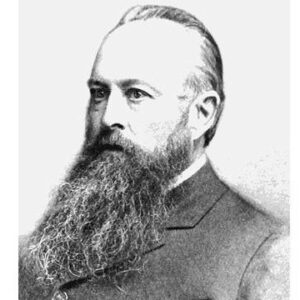John Emerich Edward Dalberg-Acton, better known as Lord Acton, was an English Catholic historian and politician who represented Bridgnorth and Carlow Borough in the English Parliament. He was dubbed the’magistrate of history’ and was widely regarded as one of the most learned and prominent Englishmen of the nineteenth century. He was fluent in a number of languages, including English, French, German, and Italian, and was acquainted with a number of eminent historians and philosophers from both Europe and America. He is well-known for his remark, ‘Power corrupts, and absolute power corrupts completely.’ He was a self-taught scholar who believed in the application of scientific methods to the study of history and was also a prominent figure in the liberal Catholic movement. He studied under Ignaz von Dollinger, a renowned church historian, and was profoundly influenced by him. He developed an early interest in politics and was elected to the House of Commons from the Irish constituency of Carlow. He spent a good deal of time traveling around Europe and the United States’ intellectual centers. He was a stalwart defender of religious and political liberty, serving as editor of the journal ‘The Rambler’ and writing extensively on social, political, and religious ideas and issues.
Childhood & Adolescence
He was born into an ancient Roman Catholic family in Italy. Sir Richard Acton was a descendant of an established English line, while Countess Marie Louise de Dalberg came from a Rhenish family in Germany.
Acton’s father died when he was three years old. His mother married Lord George Leveson (later known as Earl Granville) three years later, and the family relocated to the United Kingdom.
While still a child, he learned to speak English, German, Italian, and French. He studied until 1848 at St. Mary’s College in Oscott under Dr. Wiseman. He then traveled to Edinburgh to receive private tutoring.
He desired to attend Cambridge but was denied admission due to his Catholic faith. As a result, he was sent to Munich, Germany, to study under the eminent theologian Johann Joseph Ignaz von Dollinger, who instilled in the young man an abiding passion for historical research.
Career of Lord
He was appointed Deputy Lieutenant of Salop in 1855. Lord Acton traveled to Moscow as the British representative at Alexander II of Russia’s coronation with his stepfather, Lord Granville, who had several prominent political connections.
His stepfather assisted him in entering politics, and he was elected to the House of Commons in 1859 from the Irish constituency of Carlow. He was an ardent supporter of William Ewart Gladstone, the Prime Minister at the time. His parliamentary career came to an end following his defeat in the 1865 general election.
In 1859, he was appointed editor of the Roman Catholic monthly newspaper ‘The Rambler.’ He contributed several articles to the paper on social, political, and religious issues and quickly established a reputation as a staunch supporter of religious and political liberty. In 1862, he merged the paper with the ‘Home and Foreign Review.’
He came into conflict with the Roman Catholic hierarchy as a result of his independent thought and liberalism, and Cardinal Wiseman censured the paper, forcing Acton to halt publication. He continued to write, however, and was a regular contributor to ‘North British Review’ and ‘The Chronicle’.
In 1869, Queen Victoria created him a peer. This social advancement was largely facilitated by Prime Minister Gladstone’s influence; the two men were close friends who held each other in high regard.
He was a believer in using scientific inquiry to discover historical and philosophical truths. Throughout the 1870s and 1880s, he worked on deciphering the relationship between history, religion, and liberty, and his views on the subjects evolved.
In 1870, he joined his mentor Dollinger in opposing the First Vatican Council’s efforts to spread the doctrine of papal infallibility. He even traveled to Rome, albeit unsuccessfully, to lobby against it.
He was a scholar who enjoyed reading, studying, and learning. Despite his vast knowledge, however, he was not a prolific writer.
Two of his few published works were two lectures on ‘The History of Freedom in Antiquity’ and ‘The History of Freedom in Christianity’ that he delivered in Bridgnorth in 1877.
In 1878, he published an essay titled ‘Democracy in Europe’ in the ‘Quarterly Review’. In 1895, he was appointed Regius Professor of Modern History at Cambridge. He delivered his inaugural address on ‘The Study of History,’ which was later accompanied by notes.
Significant Works of Lord
He was a celebrated Catholic historian who was widely regarded as the most learned Englishman of his generation. He argued for the use of scientific inquiry in the study of history and was a stalwart supporter of an individual’s religious and political freedom.
Awards and Accomplishments
In 1872, he was awarded an honorary Doctor of Philosophy degree by the University of Munich, and in 1888, he was awarded an honorary Doctor of Laws degree by the University of Cambridge.
Personal History and Legacies
In 1865, he married Marie Anna Ludomilla Euphrosina von Arco auf Valley. The couple was blessed with six children. He passed away in 1902 as a result of an illness.
Estimated Net Worth
The net worth of Lord is unknown.
Trivia
This eminent intellectual famously stated, “Power corrupts, and absolute power corrupts completely.”


